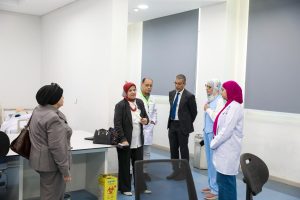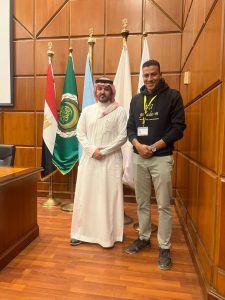Visit of the Medical Sector Committee Delegation to Galala University
Morning clinics were still in simulation when the guests arrived—exactly the point. Galala University welcomed a delegation from the Medical Sector Committee to see teaching and assessment where they matter most: inside labs, skills centers, and classrooms shaped around clinical competence. The visit was led by Prof. Madiha Wasif (Professor of Forensic Medicine, Zagazig University) and Prof. Safaa Al-Munaizaa (Professor of Pediatrics, Al-Azhar University), and focused on academic development, future cooperation, and alignment with national quality and accreditation standards.
The program opened with a concise briefing on GU’s medical education model—spiral curricula, early clinical exposure, and structured skills progression—before moving directly to site walkthroughs. In the clinical skills and simulation center, faculty demonstrated OSCE station design, debriefing protocols, and incident-reporting workflows that turn mistakes into safer practice. The tour continued through anatomy and physiology labs, where guests reviewed timetables, calibration logs, and safety SOPs alongside student portfolios and assessment rubrics.
Roundtable discussions then linked facilities to outcomes. Topics included:
-
Curriculum currency: mapping course ILOs to national competency frameworks; embedding evidence-based practice and patient communication.
-
Assessment integrity: blueprinting for written and practical exams, examiner calibration, and post-exam analytics.
-
Placements & partnerships: supervision ratios, feedback loops with hospital preceptors, and pathways for inter-university teaching exchanges.
-
Faculty development: peer observation, micro-credential tracks for clinical educators, and documentation for periodic review.
“Quality shows up in the small systems—how a station runs, how feedback is captured, how quickly it improves,” one committee member remarked after the OSCE debrief.
Both sides identified next steps: co-hosted calibration workshops, shared examiner pools for selected modules, and a joint timetable to cross-review syllabi where pediatric and forensic content intersect with core rotations. The visit closed with agreement to draft a short action memo listing owners, milestones, and metrics (competency attainment, OSCE reliability indices, graduate feedback), reinforcing a culture of evidence and continuous improvement.
This engagement underscores Galala University’s approach to medical education—applied, auditable, and collaborative—and strengthens national networks that help students move confidently from classroom to clinic.





